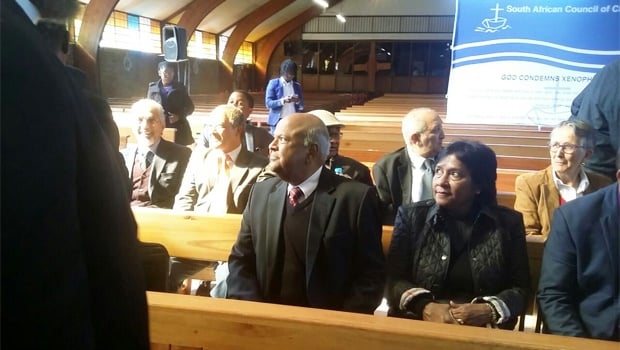
The South African Council of Churches on Thursday, in Soweto, revealed the findings of its research into state capture, showing at least seven ways the scheme to loot state resources has been executed in South Africa by powerful people aligned with President Jacob Zuma.
The probe, titled the “Unburdening Panel”, followed complaints from ANC politicians and senior civil servants that they had been pressured to do business favours for Zuma’s friends, the Guptas.
The ANC had last year referred complainants to party secretary-general Gwede Mantashe but the process was abandoned because only one person made a submission.
Among the complainants were former deputy finance minister Mcebisi Jonas, former ANC MP Vytjie Mentor and former Cabinet spokesperson Themba Maseko — the only person to make a submission to Mantashe.
Former finance minister Pravin Gordhan, former Hawks head Anwa Dramat and former South African Revenue Service head Ivan Pillay received special mention at the event.
The report detailed these seven ways through which the president’s power elite undermines the state:
1. Securing control over state wealth, through the capture of state-owned companies by chronically weakening their governance and operational structures;
2. Securing control over the public service by weeding out skilled professionals;
3. Securing access to rent-seeking opportunities by shaking down regulations to their advantage, and to the disadvantage of South Africans;
4. Securing control over the country’s fiscal sovereignty;
5. Securing control over strategic procurement opportunities by intentionally weakening key technical institutions and formal executive processes;
6. Securing a loyal intelligence and security apparatus; and
7. Securing parallel governance and decision-making structures that undermine the executive.
The seven points go in to detail to show how Zuma and the various state-owned companies had made strategic Cabinet and board changes that would facilitate state capture, with particular focus on Transnet and Denel.
A section titled “How one company was forced out of business in favour of a Gupta company” outlines how Glencore was forced to sell its Optimum Coal Mine operations to the Gupta-owned Tegeta Exploration and Resources.
To show how institutions were weakened, in a bid to control strategic procurement opportunities, the report uses the nuclear deal as an example. It details specific events from May 2010 through to April 2017 when the Western Cape High Court ruled that the nuclear deal was unlawful because government did not follow due process.
The report concludes by asking “whether Cabinet is still able to function as a forum for honest deliberation on matters of public policy.”
SACC Presentation on state capture by CityPress on Scribd




 Publications
Publications
 Partners
Partners








